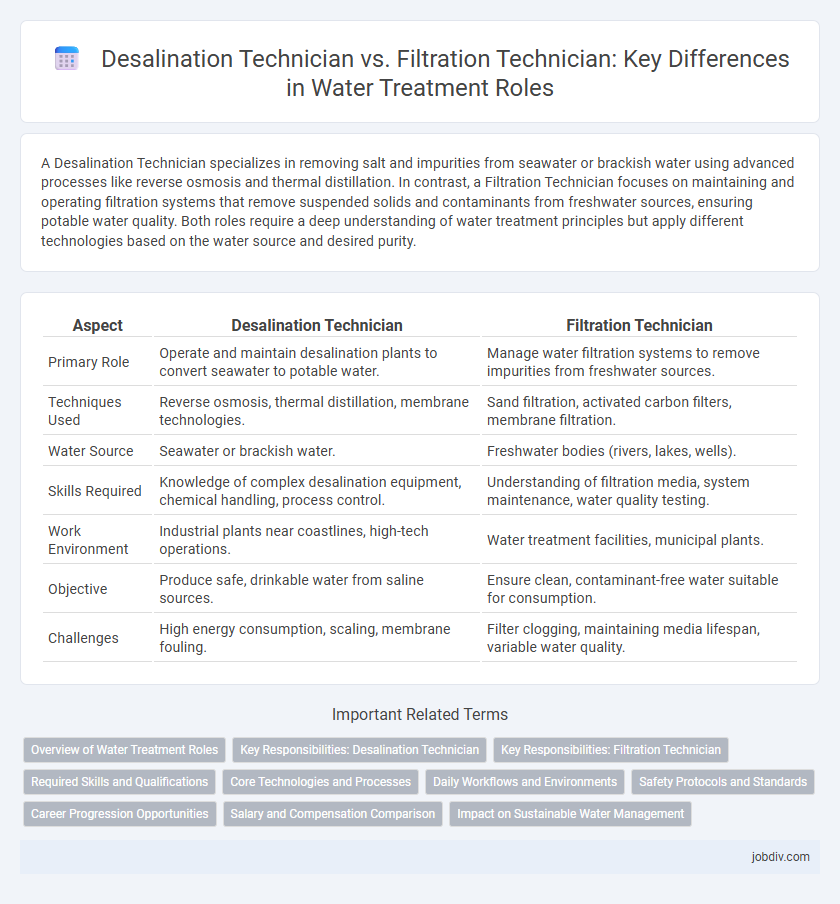A Desalination Technician specializes in removing salt and impurities from seawater or brackish water using advanced processes like reverse osmosis and thermal distillation. In contrast, a Filtration Technician focuses on maintaining and operating filtration systems that remove suspended solids and contaminants from freshwater sources, ensuring potable water quality. Both roles require a deep understanding of water treatment principles but apply different technologies based on the water source and desired purity.
Table of Comparison
| Aspect | Desalination Technician | Filtration Technician |
|---|---|---|
| Primary Role | Operate and maintain desalination plants to convert seawater to potable water. | Manage water filtration systems to remove impurities from freshwater sources. |
| Techniques Used | Reverse osmosis, thermal distillation, membrane technologies. | Sand filtration, activated carbon filters, membrane filtration. |
| Water Source | Seawater or brackish water. | Freshwater bodies (rivers, lakes, wells). |
| Skills Required | Knowledge of complex desalination equipment, chemical handling, process control. | Understanding of filtration media, system maintenance, water quality testing. |
| Work Environment | Industrial plants near coastlines, high-tech operations. | Water treatment facilities, municipal plants. |
| Objective | Produce safe, drinkable water from saline sources. | Ensure clean, contaminant-free water suitable for consumption. |
| Challenges | High energy consumption, scaling, membrane fouling. | Filter clogging, maintaining media lifespan, variable water quality. |
Overview of Water Treatment Roles
Desalination Technicians specialize in removing salt and minerals from seawater using processes like reverse osmosis and thermal distillation, ensuring potable water production in arid regions. Filtration Technicians focus on mechanical and chemical filtration methods to eliminate particles, contaminants, and pathogens from freshwater sources. Both roles are critical in water treatment plants, with Desalination Technicians addressing saltwater challenges and Filtration Technicians maintaining water quality through advanced filtration systems.
Key Responsibilities: Desalination Technician
Desalination Technicians specialize in operating and maintaining advanced reverse osmosis and thermal desalination equipment to convert seawater or brackish water into potable water. Their key responsibilities include monitoring pressure gauges, ensuring membrane integrity, managing chemical dosing systems, and troubleshooting mechanical or electrical issues within desalination plants. Expertise in water quality analysis and adherence to environmental regulations are crucial to optimize plant performance and ensure safe, reliable freshwater production.
Key Responsibilities: Filtration Technician
Filtration Technicians are responsible for maintaining and monitoring water filtration systems to ensure the removal of contaminants and the delivery of safe, clean water. They conduct routine inspections, perform filter replacements, and troubleshoot system malfunctions to optimize filtration efficiency. These technicians also analyze water quality data to adjust filtration parameters and comply with regulatory standards.
Required Skills and Qualifications
Desalination Technicians require expertise in reverse osmosis, membrane technology, and knowledge of chemical dosing for salt removal, along with skills in monitoring system pressure and flow rates. Filtration Technicians need proficiency in biological and mechanical filtration processes, experience operating and maintaining sand filters or carbon filters, and capabilities in water quality testing and particle size analysis. Both roles demand strong troubleshooting abilities, safety protocol adherence, and formal training or certification in water treatment technologies.
Core Technologies and Processes
Desalination technicians specialize in core technologies such as reverse osmosis, multi-stage flash distillation, and electrodialysis to convert seawater or brackish water into potable water by removing salts and minerals. Filtration technicians focus on physical and biological filtration processes, employing media filters, membrane filtration, and ultraviolet sterilization to remove suspended solids, pathogens, and contaminants from freshwater sources. Both roles require expertise in water quality analysis and system maintenance, but desalination emphasizes salt extraction technologies while filtration prioritizes contaminant removal and water clarity improvement.
Daily Workflows and Environments
Desalination Technicians operate and maintain systems that remove salt and other minerals from seawater, working primarily in coastal plants with high humidity and exposure to corrosive environments. Filtration Technicians focus on designing, monitoring, and troubleshooting filtration units in water treatment facilities, often dealing with suspended solids and organic matter removal in both municipal and industrial contexts. Both roles require regular equipment inspections, system calibrations, and adherence to safety protocols, but desalination technicians handle more complex chemical processes, while filtration technicians emphasize particulate filtration and membrane integrity.
Safety Protocols and Standards
Desalination technicians adhere to stringent safety protocols involving high-pressure systems and chemical handling to prevent exposure to hazardous materials and ensure equipment integrity. Filtration technicians focus on contamination control and proper handling of filtration media to avoid microbial risks and maintain water quality standards. Both roles require compliance with industry regulations such as OSHA and EPA guidelines to safeguard worker health and environmental safety.
Career Progression Opportunities
Desalination technicians often advance by specializing in reverse osmosis systems and securing certifications in water treatment technology, enabling roles in project management and plant operations. Filtration technicians can progress by gaining expertise in advanced filtration methods like ultrafiltration and nanofiltration, leading to supervisory positions and quality control management. Both career paths benefit from continuous training and industry certifications, enhancing job stability and opportunities in the expanding water treatment sector.
Salary and Compensation Comparison
Desalination technicians typically earn higher salaries than filtration technicians due to the specialized knowledge required to operate complex desalination systems, with average annual pay ranging from $55,000 to $75,000. Filtration technicians generally receive compensation between $40,000 and $60,000, reflecting the broader demand and lower technical barriers in water filtration maintenance and operation. Benefits and overtime opportunities in desalination roles often enhance total compensation, making these positions more lucrative within the water treatment sector.
Impact on Sustainable Water Management
Desalination technicians play a crucial role in converting seawater into potable water, directly addressing freshwater scarcity and supporting coastal sustainability. Filtration technicians enhance water quality by maintaining filtration systems that remove contaminants, enabling efficient reuse and reducing reliance on freshwater sources. Both roles contribute to sustainable water management by optimizing resource use and minimizing environmental footprint through advanced water treatment technologies.
Desalination Technician vs Filtration Technician Infographic

 jobdiv.com
jobdiv.com